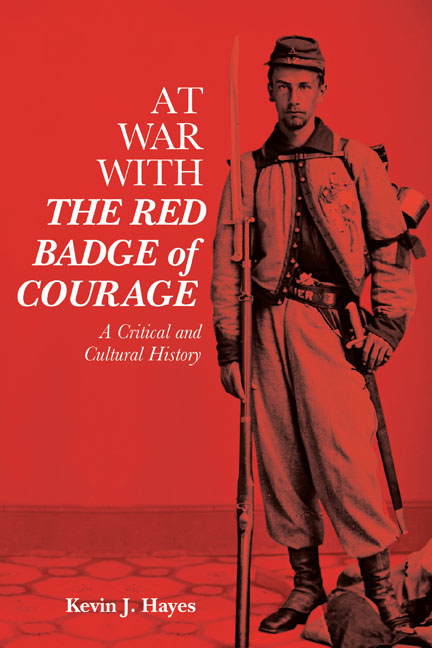4 - The Red Badge of Courage and World War II
Published online by Cambridge University Press: 24 November 2020
Summary
In 1939, the year both France and Great Britain declared war on Germany, Les Libertés Françaises, a Paris publisher, reissued the French translation of The Red Badge of Courage that Francis Viélé- Griffin and Henry-D. Davray had first released in 1911. A similar phenomenon occurred in Britain. In 1939 Collins published a new edition of Red Badge as part of its series of handsomely printed, small-format classics. The Collins Red Badge remained in print during the war. It was the kind of book British parents could buy for sons headed to the front lines. My copy, which I bought at a secondhand bookshop in Bristol, contains the following presentation inscription: “To Christopher from Mummie, 1943.”
The Collins Red Badge appeared with an introduction by Frederick Brereton, a decorated World War I veteran who established his literary reputation as the author of war stories for boys. Brereton emphasizes Crane's originality: “Never before in fiction had the heart of a soldier been laid bare with such consummate skill and disconcerting honesty. Gone for ever with the publication of Stephen Crane's book was the illusion of the soldier as a romantic figure” (ix). Both the Collins and the Libertés Françaises editions indicate that what had happened during World War I was happening again during World War II. The outbreak of war created a new demand for books about war in general and for The Red Badge of Courage in particular.
Writing in 1940, D. R. Lock, a Welsh contributor to Catholic World who went by the mellifluous pen name Petronius Applejoy, stressed the newfound relevance of Red Badge. Lock ends his essay with the following paragraph:
War again stalks in Europe. Men are once more at each other's throats. The Federation of British Commonwealths fights the evil thing that coming out of Germany would uproot every trace of our ancient Western culture. So Crane's book takes on a new and terrible appositeness. May that appositeness end with this conflict: let that be our prayer. Let us hope that to generations yet unborn The Red Badge of Courage will mean no more than an account of something baleful that has long since passed away; that will never come within their ken; that they themselves will never experience. (594)
- Type
- Chapter
- Information
- At War with The Red Badge of CourageA Critical and Cultural History, pp. 89 - 114Publisher: Boydell & BrewerPrint publication year: 2020

